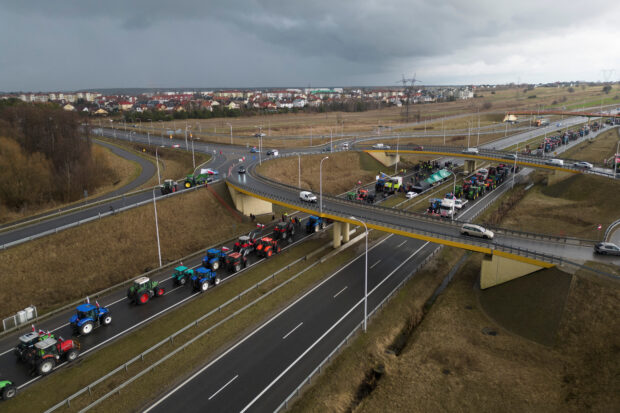Polish farmers anger Ukraine with border blockade, grain spillage

A drone view of Polish farmers blocking an expressway and protesting over price pressures, taxes and green regulation, grievances shared by farmers across Europe, and against the import of agricultural produce and food products from Ukraine, in Dlugie near Lublin, Poland, February 20, 2024. REUTERS
OKOPY, Poland — Protests by Polish farmers sparked anger in neighboring Ukraine on Tuesday, as Kyiv called on the European Commission to take robust action after demonstrators blockaded the border and opened railway carriages to let grain spill out.
Warsaw has been a staunch supporter of Kyiv in its fight to repel a full-scale Russian invasion launched in 2022, but protests from farmers complaining of unfair competition have strained ties that were already on edge after truckers blocked border crossings around the turn of the year.
Tuesday’s protests from farmers marked an escalation from previous demonstrations, with a near-total blockade of all Ukrainian border crossings and disruption at ports and on roads nationwide.
READ: Polish farmers’ protests crank up pressure on EU agriculture head
Television footage showed protesters at the Medyka border crossing opening railway carriages to allow grain to pour onto the tracks.
“The scattering of Ukrainian grain on the railroad tracks is another political provocation aimed at dividing our nations,” Ukrainian Deputy Prime Minister Oleksandr Kubrakov said in a post on X.
Ukrainian Economy Minister Yulia Svyrydenko said Kyiv had informed the European Commission of the actions of Polish protesters at the Ukrainian border and expected a robust response. Agriculture Minister Mykola Solskyi said the grain was headed to Germany and would not have entered the Polish market.
Polish President Andrzej Duda told Ukrainian Radio and the Suspilne broadcaster that the Polish government is negotiating with the farmers and trade unions and that he hopes the issue will be resolved through talks.
“We are trying to solve this problem,” Duda said, according to a transcript published on Tuesday on his presidential website.
“This is a certain conflict of interests between farmers and producers of agricultural products in Ukraine – farmers who fear for their existence.”
Farmers across Europe have been demonstrating a range of grievances, including constraints placed on them by European Union measures to tackle climate change and what they say is unfair competition from abroad, particularly Ukraine, after an EU decision in 2022 to waive duties on Ukrainian food imports.
Protesters’ tractors carried banners that read: “With grain flowing from Ukraine, Polish farmers will go bankrupt.”
An organizer of the protest at Doruhusk crossing, Marcin Wielgosz, said buses would be allowed to cross once an hour on Tuesday, but no truck would pass from 0800 to 1800 local time.
READ: Poland, Hungary ban Ukraine grain to protect local farms
“In my opinion, the border should be closed. Procedures and systems should be clarified, and then maybe it could reopen, but not with the rules that we have now. Because right now you can bring whatever you want, however much you want … into Poland,” he told Reuters.
Counter-protest
Kyiv says its agricultural exports through Eastern Europe have not damaged EU markets.
Exasperated by the Polish protests, Ukrainian haulers began their own round-the-clock counter-demonstration at three crossings. Their protest is planned to last till March 15.
Images circulated by media outlets showed Ukrainian trucks at the border bearing banners with slogans such as “Ukraine loses – Poland loses” and “The blockade of Ukraine is a betrayal of European values.”
Poland’s new pro-European government has supported the farmers’ demands, trying to balance this with its strongly pro-Ukrainian stance.
Deputy Agriculture Minister Michal Kolodziejczak told private broadcaster Polsat News that talks with Ukraine on limiting imports would continue on Wednesday.
“Today the ball is in Ukraine’s court,” he said. “Either they want to come to an agreement with us, or we will have to introduce further restrictions.”
Ukraine says the blockades are affecting its defense capability and helping Russia’s aims.
Ukrainian President Volodymyr Zelensky said on Monday the situation at the border demonstrated “the erosion of solidarity on a daily basis.”